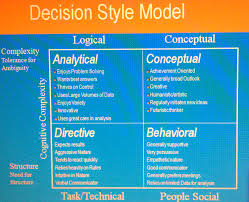Eight Tips for Developing Decision-Making Skills in Students
- Identify the problem: Before making any decision, it is important to understand and identify the problem that needs to be solved.
- Gather information: Gather as much information as possible about the available options and their consequences in order to make an informed decision.
- Consider all perspectives: Think from different angles and consider all perspectives before making a decision.
- Take your time: Don’t rush into a decision without taking the time to think it through carefully.
- Weigh your options: Compare the pros and cons of each option before deciding which one is best for you or your situation.
- Get advice: Seek out advice from others who may have valuable insight or experience with similar situations that can help you make an informed choice..
- Make a list of priorities: Prioritize what’s most important in order to narrow down your choices and decide on what’s best for you in the long run..
- Trust yourself : At the end of the day, trust your instincts and go with what feels right for you
Identify the problem: Before making any decision, it is important to understand and identify the problem that needs to be solved.
Making decisions can be a difficult task, especially for students. It can be easy to get overwhelmed when faced with a difficult decision, but there are some tips that can help make the process easier. One of the most important tips for making a good decision is to identify the problem that needs to be solved.
It is important to take time to understand and identify the problem before making any decisions. This involves analyzing the situation and understanding what needs to be done in order to solve it. Taking time to properly identify the problem will help narrow down possible solutions and make it easier to make an informed decision.
Identifying the problem also helps in understanding what resources are available and what steps need to be taken in order to reach a successful solution. This could involve researching potential solutions, talking with experts or seeking advice from trusted sources. Taking this step will help ensure that all relevant information is taken into consideration when making a decision.
By taking the time to properly identify the problem before making any decisions, students can feel more confident in their ability to make an informed decision that will lead them towards success.
Gather information: Gather as much information as possible about the available options and their consequences in order to make an informed decision.
Making decisions can be a difficult task for students, especially when faced with a multitude of options. In order to make an informed decision, it is important to gather as much information as possible about the available options and their consequences.
Having access to accurate information is essential for making the right decision. Researching and consulting with experts or other reliable sources can help students gain insight into the different possibilities and how they may affect their future. Additionally, talking to people who have experience in similar situations can provide valuable advice and guidance.
When gathering information, it is important to consider both short-term and long-term consequences of each option. This will give students a better understanding of how their decision may affect them in the future. It is also important to look at all sides of an issue before making a final decision.
By taking the time to research and evaluate all available options, students can make informed decisions that will have positive outcomes in the long run. Gathering as much information as possible is key for making sound decisions that will benefit both present and future goals.
Consider all perspectives: Think from different angles and consider all perspectives before making a decision.
Making decisions can be difficult for students, especially when it comes to important matters. It is important to take the time to consider all perspectives before making a decision. This means taking the time to think from different angles and understanding how different people might view the situation.
One way to do this is by talking to different people about the issue and getting their opinions. This can include friends, family, teachers, or anyone who can offer an outside perspective. By doing this, students can gain a better understanding of the issue and how it might affect them and others.
Another way to consider all perspectives is by looking at the problem from multiple angles. This means taking into account not only the facts of the situation but also how it might affect people emotionally or socially. This can help students gain a better understanding of how their decision will impact them and those around them.
Finally, it is important for students to take their own feelings into consideration as well when making decisions. Students should try to think about what they believe is right for them in any given situation and make sure that their own values are taken into account when making decisions.
By considering all perspectives before making a decision, students will be better able to make informed choices that they feel confident in. Taking the time to think through all aspects of an issue will help ensure that students make decisions that are right for them and those around them.
Take your time: Don’t rush into a decision without taking the time to think it through carefully.
Making decisions can be difficult for students, especially when there are multiple options available. It is important to take your time and think through the pros and cons of each option before making a final decision. Rushing into a decision without taking the time to consider all possibilities can lead to regret and frustration down the line.
Taking your time to make a decision allows you to weigh all of your options carefully, so you can make an informed choice that is right for you. Consider any potential risks or consequences associated with each option before making a final decision. Talk to trusted advisors or friends who may have valuable insights on the situation as well.
By taking your time when making decisions, students can ensure that they are making choices that are in their best interest and will lead them towards their desired outcome. Taking the extra time to think through a situation carefully will help students make more informed decisions in the future.
Weigh your options: Compare the pros and cons of each option before deciding which one is best for you or your situation.
Making decisions can be difficult for students, especially when trying to decide between two or more options. It is important for students to weigh their options and compare the pros and cons of each before deciding which one is best for them or their situation.
Weighing your options involves taking the time to consider all aspects of each option and deciding which one is most beneficial. This can include looking at the potential outcomes, costs, risks, and rewards of each option. It is also important to consider how each option will impact you in the short-term and long-term.
When weighing your options, it is important to look at both sides objectively and without bias. Try to remove any personal feelings or opinions from the equation when making a decision. Also make sure to consider any external factors that may impact your decision such as family, friends, or other commitments.
By taking the time to weigh your options before making a decision, you will be able to make a more informed choice that best suits your needs or situation. This will help ensure that you make a decision that will benefit you in the long run and help you achieve success in whatever path you choose.
Get advice: Seek out advice from others who may have valuable insight or experience with similar situations that can help you make an informed choice..
Making decisions can be hard, especially for students who may not have a lot of life experience. It is important to remember that no one is expected to know all the answers, so it is wise to seek advice from those who may have more knowledge and insight into a situation.
Getting advice from others can help students make informed decisions that are right for them. This could include talking to family members, teachers or mentors who can provide valuable insight and experience in similar situations.
When seeking advice, it is important to consider the source and take into account any bias they may have. It can also be helpful to get multiple perspectives from different people in order to gain a more complete picture of the situation before making a decision.
By taking the time to seek advice from others, students can make decisions with confidence knowing that they have taken all factors into account and made an informed choice that is best for them.
Make a list of priorities: Prioritize what’s most important in order to narrow down your choices and decide on what’s best for you in the long run..
Making decisions can be difficult for students, especially when there are so many options available. To help make the process easier and more efficient, it is important to make a list of priorities. Prioritizing what is most important can help narrow down the choices and decide on what is best for the long run.
Start by making a list of all the possible options and then rank them in order of importance. Consider factors such as time, cost, energy, and resources that will be needed to complete each option. This will help to determine which options should be prioritized first.
Once a list of priorities has been established, it is important to consider each option carefully and weigh the pros and cons. Think about how each choice will affect you in the long run and if it is worth investing your time and energy in it. This will help you determine which choice is best for your situation.
Finally, make sure to take some time to reflect on your decision before committing to it. Ask yourself if this is something that you truly want or if it was just an impulse decision made out of pressure or fear. Taking a step back can help ensure that you make decisions that are right for you in the long run.
By making a list of priorities and considering each option carefully, students can make better decisions that are right for their situation in the long run.
Trust yourself : At the end of the day, trust your instincts and go with what feels right for you
Making decisions is a part of life and it can be difficult to know which path to take. For students, this can be especially challenging as they often have to make decisions that will affect their future. One tip for making decisions is to trust yourself. At the end of the day, you know yourself best and should go with what feels right for you.
It’s important to remember that you have the power to make your own decisions and that no one else can tell you what’s best for you. Take time to weigh up the pros and cons of each option and consider how it could impact your future. Once you’ve done this, trust your instincts and go with what feels right for you in the moment.
Trust yourself when making decisions and don’t be afraid to step out of your comfort zone if it feels right. Listening to advice from others can be helpful but at the end of the day, the decision is yours and yours alone. Trusting yourself gives you confidence in your ability to make sound decisions, which will help set you up for success in the future.




